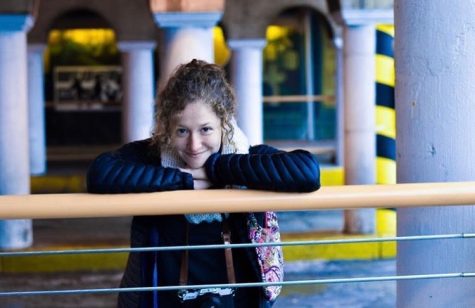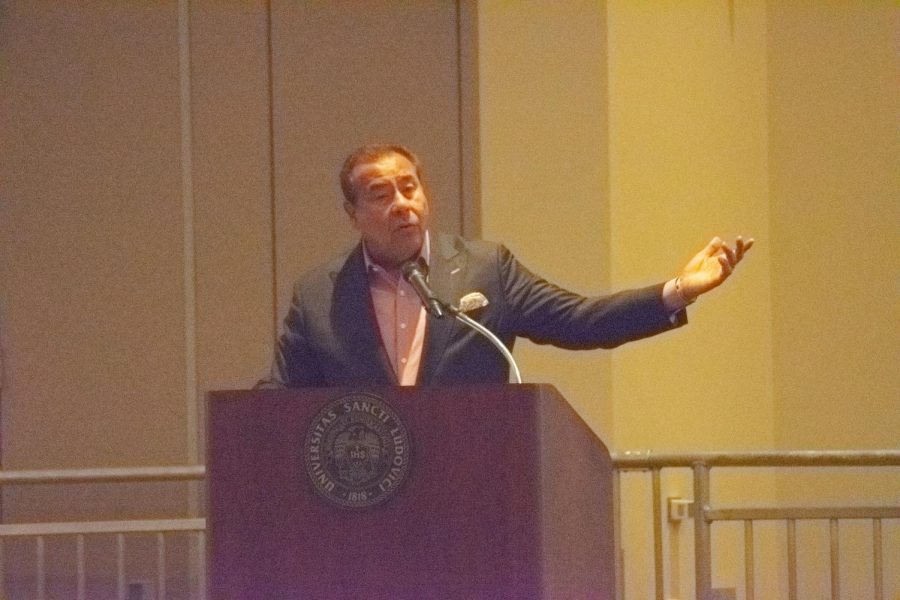Atlas Week Keynote: John Quiñones
Championed as the “face of doing the right thing” ABC news correspondent and current host of “What Would You Do?” John Quiñones knows what it is like to be on the wrong side of prejudicial remarks. He was raised in an impoverished family in Texas. His father was a janitor and dropped out of school in third grade to pick cotton, and his mother dropped out of school early to support her single mother. His parents spoke very little English even though the Quiñones family had lived in Texas for seven generations.
When Quiñones was a boy, he explained that nearly 60 percent of San Antonio spoke Spanish. People did not need to learn English because Catholic Mass was in Spanish, the general store that his family purchased food was in Spanish and the music they listened to was in Spanish. This was before a bilingual education was implemented.
On Monday, Quiñones shared his story as a young migrant-farmer-turned-journalist as the keynote speaker for the 19th annual Atlas Week. His presentation took place in the Wool Ballrooms at 5:30 p.m.
Much of his success is accredited to his parents who instilled the importance of education. “My mother grabbed me by the ear and dragged me back to Mrs. Gregory’s class,” Quiñones said, after mentioning that he left his first grade class early one time. His parents wanted him to resort to more than a janitor or farmer.
When Quiñones was 13, his father was laid off work. He and his family joined a caravan to harvest cherries to make ends meet. After cherry season commenced, they traveled to Ohio to pick tomatoes. Quiñones wanted to amount to more, though, and receive a college education – but he was seldom believed in by his advisors and teachers because of his nationality.
“I would ask my teachers and counselors how do I prepare for the ACT and Advanced Placement classes in English, math, biology to get into college some day,” Quiñones said. “My own teachers would tell me, ‘That’s great you want to be a TV reporter some day, but we think you should try woodshop, or metal shop or auto mechanics.’ My own teachers and my own counselors would do what people do on my show ‘What Would You Do?’ every Friday night – they would judge me by the color of my skin and the accent in my voice.”
Quiñones had faith in taking the first step, even though he could not see the entire staircase. He had a heavy Mexican accent and was painfully shy in front of audiences, but he wanted to rewrite the typical narratives on television that broadcasted Mexican-Americans as violent and drug-infested. He felt hurt because he knew there were heroes in his community.
His first step involved participating in drama class, where he was required to speak in front of large audiences and enunciate. Fast forward to joining his high school newspaper, receiving assistance from Upward Bound, a federally funded educational program, interning at radio stations, receiving a fellowship to study at Columbia University and, finally, receiving his first TV job in Chicago. It was at WBBM that the spark for “What Would You Do?” formed.
“I did a story on a hot button topic: illegal immigration,” Quiñones said. “I had relatives and friends who had come over illegally to the U.S. I wanted to know what are the push factors, how desperate must someone be to come into this country, risking their lives and spending their life savings […] I convinced my boss to let me go undercover and to Mexico and pose as a Mexican immigrant trying to come into the U.S.”
After going into a small town in Mexico, he found a smuggler who sold him a fake birth certificate and Social Security number, which was all captured on camera. Quiñones was then ferried across the Rio Grande to the U.S. and took a bus back to the outskirts of Chicago to a restaurant. Quiñones had heard that the restaurant housed seven undocumented immigrants. The owner had not paid any of them for 17 weeks for washing dishes.
After being hired by the restaurant owner, Quiñones worked by day but interviewed the undocumented workers by night. “They told me they were being held as virtual slaves by the restaurant owner,” he said.
After Quiñones’ time at the restaurant, his story aired on CBS. The restaurant was shut down, the owner was arrested and the workers were given their owed money and temporary visas to stay in the U.S.
It was through this story that Quiñones knew that he, as a Latino-American reporter, could tell the story better than anyone because of where he came from. His journey is represented through an atlas, the precursor of a GPS. “It allows us to find out where we’ve been, where we are right now, and it also helps us to decide where we’re going,” he said.
Your donation will support the student journalists of Saint Louis University.

Staunch entered SLU as a Biomedical Engineering major on a Pre-med track, with the intention of continuing her studies in medical school. After a year and a half at SLU, she realized she missed the balance of the arts with sciences as she was previously an editor in her high school yearbook committee.
"Working for UNews, whether it was as Associate News Editor, Managing Editor, or Editor-in-Chief, has taught me the value of working on tight deadlines and how to adequately adapt to certain unexpected situations. The field of Journalism is incredibly fast paced - but that is why I love it so much," Staunch said. "There is always something new occurring, and you would not be able to effectively complete your job unless you had the support of your other editors and staff."
Though paradoxical in nature, she switched her major to Communication. She wants to incorporate both her analytical and creative sides to report on medical topics. Her dream job: to write for Discover Magazine.
When Staunch is not in the newsroom, she is captaining the women’s Ultimate Frisbee team at SLU. She began playing her freshman year and enjoys it as an outlet.




